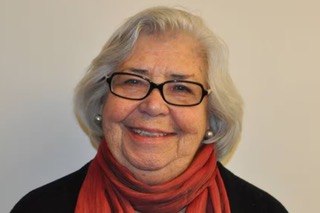Marysa Navarro-Aranguren, Charles A. and Elfriede A. Collis Professor emerita of history at Dartmouth College, died on March 2, 2025, in Cambridge, Massachusetts. She is survived by her daughter, Nina Gerassi-Navarro, King Felipe VI of Spain Professor in Spanish Culture and Civilization at Tufts University; her son-in-law, Ernesto Livon-Grosman; and her beloved grandchildren, Nicolás and Natalia Livon-Navarro.

Photo courtesy Dartmouth College
Marysa was born in Pamplona, Spain, in 1934, and her life was irrevocably shaped by the Spanish Civil War. Her father, Vicente Navarro, was a schoolteacher and union militant, and as the Nationalist forces advanced, the family was forced into exile. Vicente, his wife Luisa Aranguren, and their children Alberto and Marysa fled to France, where Alberto died several years later. A third child, Dora, was evacuated to the Soviet Union, where she lived for 10 years before rejoining the family in France. Owing to those early experiences, and to her later encounters with the Latin American dictatorships of the 1960s, 1970s and 1980s, Marysa was a fervent and lifelong antifascist.
Eventually recognizing that the Spanish fascists were unlikely to be removed from power, in 1948, the family moved to Uruguay. Marysa flourished in her high school and university studies there, and in 1958, she was awarded a fellowship to attend graduate school at Columbia University. She studied with the legendary Latin Americanists Frank Tannenbaum and Lewis Hanke; her dissertation, on right-wing politics in Argentina, was published in 1969 as Los nacionalistas.
In 1968, Marysa accepted a position at Dartmouth College, with at that time an all-male student body. She quickly assumed a high-profile role in campus life as an inspiring classroom instructor and as a vocal advocate of co-education. After the university began admitting women students in 1972, Marysa shifted her focus to welcoming them and female faculty to the college and to expanding their presence. She was the founding director of both the Women’s Studies Program—the first established in the Ivy League—and the Latin American, Latino, and Caribbean Studies Program.
Initially trained as a traditional political historian, during the 1970s, Marysa retooled to become a pioneering historian of women and gender in Latin America. From 1979 through her retirement in 2010, she contributed articles to publications including Signs, Debate Feminista, and Estudos Feministas that reported on the state of feminism and women’s studies in the region. In 1999, she published Women in Latin America and the Caribbean, co-authored with Virginia Sánchez Korrol. She also collaborated with Catharine Stimpson on a four-volume edited collection, Un nuevo saber (1999–2002), aimed at introducing Latin American readers to debates and discussions in US and European feminism and women’s studies.
Marysa’s academic and political passions converged in her magnum opus, a biography of Eva Perón. Written in direct, engaging language, and published in both English (Eva Perón, co-authored with Nicholas Fraser, 1981) and Spanish (Evita, 1982), the book masterfully demystified Evita’s life, situated her in the context of mid-century Argentina, and explored the complexities of her role in Peronist populism. Both versions of the book have gone through multiple reprintings, and it remains the definitive biography of that world-historical figure.
A deeply gregarious person who loved working with others, Marysa served on numerous editorial and philanthropic boards, as president of the New England Council of Latin American Studies (NECLAS), and as president of the Latin American Studies Association (LASA). In 2017, she achieved a trifecta of professional distinctions: LASA gave her its Kalman Silvert Award for her lifetime contributions to the study of Latin America; NECLAS created the Marysa Navarro Best Book Prize, given annually in her honor; and in what was for her probably the most meaningful recognition of all, the Public University of Navarre, in her birthplace of Pamplona, awarded her a doctorate honoris causa.
Marysa was an irrepressible, charismatic, larger-than-life personality. When I first met her at Dartmouth in the late 1960s, she stood out in almost every way: as a cosmopolitan sophisticate in small-town New Hampshire; as a voluble (in five languages!) Latina feminist in a bastion of white male privilege; and as an outspoken emissary of the Global South—a concept that barely existed at that time but that Marysa fully embodied. No one who knew her will ever forget her.
George Reid Andrews
University of Pittsburgh
This work is licensed under a Creative Commons Attribution-NonCommercial-NoDerivatives 4.0 International License. Attribution must provide author name, article title, Perspectives on History, date of publication, and a link to this page. This license applies only to the article, not to text or images used here by permission.
